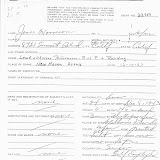Having invented the Long Playing record, Columbia celebrated its 10th anniversary with this mighty 33 1/3 rpm disc, by making this narrative anthology hosted by another inventor, the "inventor" of the news anchor, Walter Cronkite. The 12-in. record album contains popular and classical excerpts from 1948's Oscar Levant performance of Gershwin's Rhapsody in Blue (Ormandy and Philadelphia Orchestra), all the way to 1957's Firebird Suite (Stravinsky) conducted by Leonard Bernstein with the New York Philharmonic.
This record was likely given out in limited quantities and never issued to the general public. It also includes the popular side of Columbia, from the earliest original cast albums of "Kiss Me, Kate" and "South Pacific" down to 1957 and the then-current stable of artists such as Johnny Mathis, Ray Conniff, Les Elgart and Erroll Garner. Cronkite's classic reading of the continuity script has the familiar ring of history in the making.
Search This Blog
Monday, July 20, 2009
Cronkite shills for Columbia Records
Walter Cronkite was known as a news reader and reporter, rather than commentator. We also have a record of him flacking for Columbia Records in 1958. It's on an album produced by the Columbia Records Public Relations Department, called "Hear It Now On LP: The Story of the First LP Decade on Columbia Records."
Labels:
Columbia Records,
Goddard Lieberson,
Leonard Bernstein,
Oscar Levant,
Stravinsky,
Walter Cronkite
Wednesday, July 1, 2009
 With New Haven officialdom in the news recently-- because of a U.S. Supreme Court decision-- it seems apt to revisit another notorious instance of uniformed New Haven getting in the news, on December 12, 1967.
With New Haven officialdom in the news recently-- because of a U.S. Supreme Court decision-- it seems apt to revisit another notorious instance of uniformed New Haven getting in the news, on December 12, 1967.According to an article in the April 12, 1968 edition of Life Magazine,a singer/poet was in the dressing room before his concert, and he and a girl decided to adjourn elsewhere. As the singer/poet told his audience later during the concert, "And we wanted some privacy / And so we went into this shower-room / We weren't doing anything, you know, / just standing there and talking. / And then this little man came in there, / This little man, in a little blue suit / And a little blue cap, /And he said, 'Whatcha doin' there?' / 'Nothin'./ But he didn't go 'way, / He stood there / And then he reached 'round behind him / And he brought out this little black can of somethin' / Looked like shaving cream, / And then he / Sprayed it in my eyes. / I was blinded for about 30 minutes..."
After that, spoken over a drumbeat (like another Morrison sometimes did), the singer resumed his song, the famous blues tune "Back Door Man." But in the concert hall, the lights came on. Bandmate Ray Manzarek whispered to Morrison to ask the audience if it wanted them to keep playing. He did, and the response left no doubt. Quoting one of his famous songs, "When the Music's Over," the singer said "Turn out the lights!"
Suddenly, Lt. James P. Kelly, head of the New Haven Police Department's Youth Division, came on stage and arrested the singer. The singer pointed his microphone at the officer and said, "Say your thing, man."
The microphone was snatched from his hand, and more policemen rushed the stage. A well known New York Times photographer, Tim Page, was pushed into the street while taking pictures of some arrests, and he was then arrested himself, along with Yvonne Chabrier, a Life Magazine reporter, and Michael Zwerin, jazz critic for the Village Voice. In addition, according to the article, "an unknown number of teen-agers were hauled off."
 |
| Jim Morrison New Haven arrest |
If you'd like more information on the band that caused this ruckus, search "The Doors" here or here. To see some pictures and the arrest documents, click on the link above: "Jim Morrison New Haven arrest."
Labels:
Jim Morrison,
Life Magazine,
Michael Zwerin,
New Haven Police Department,
The Doors,
Tim Page,
Yvonne Chabrier
Subscribe to:
Posts (Atom)
